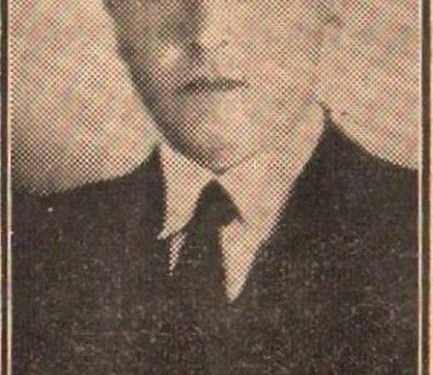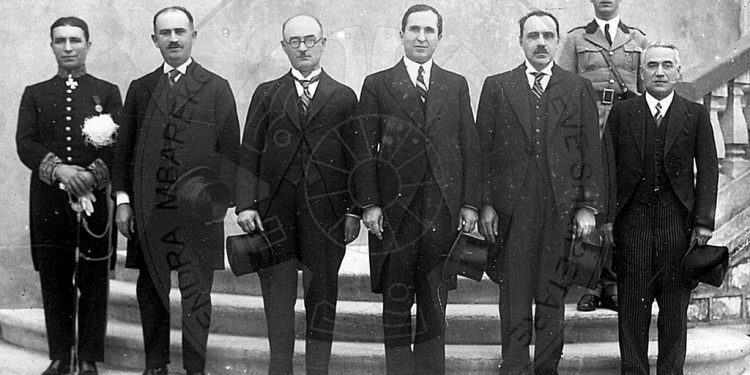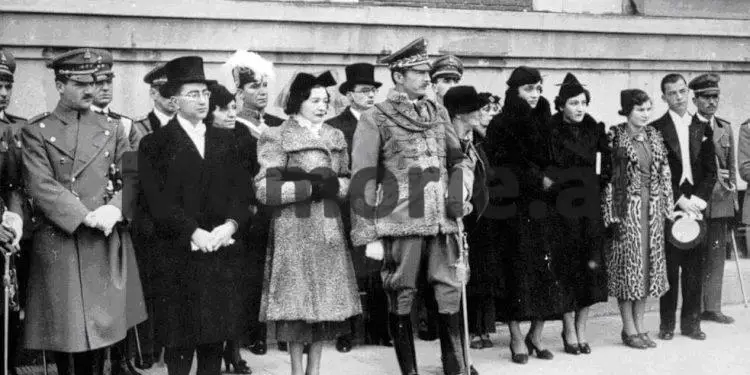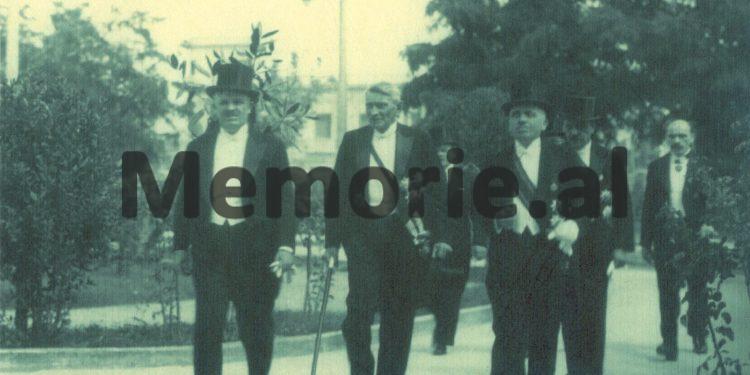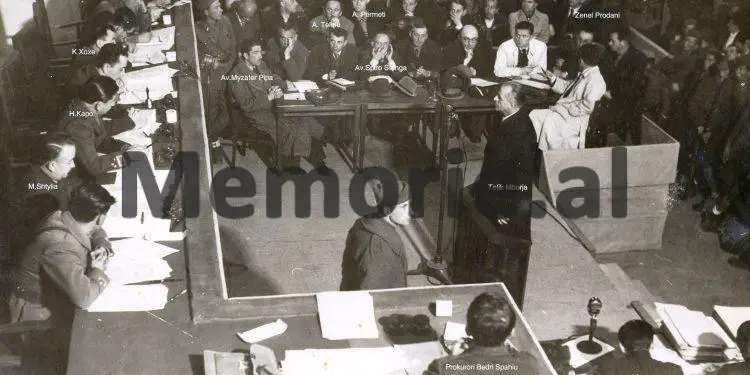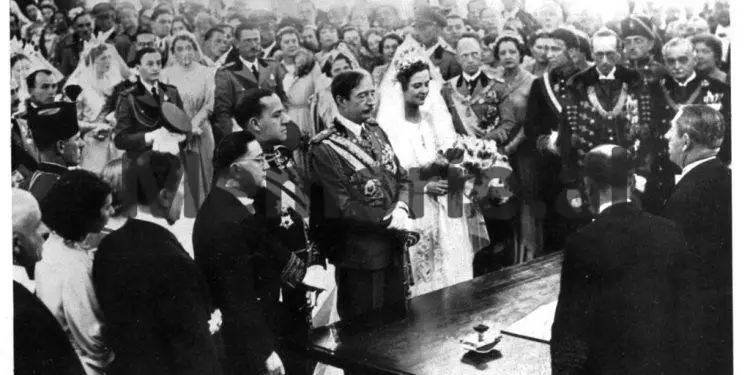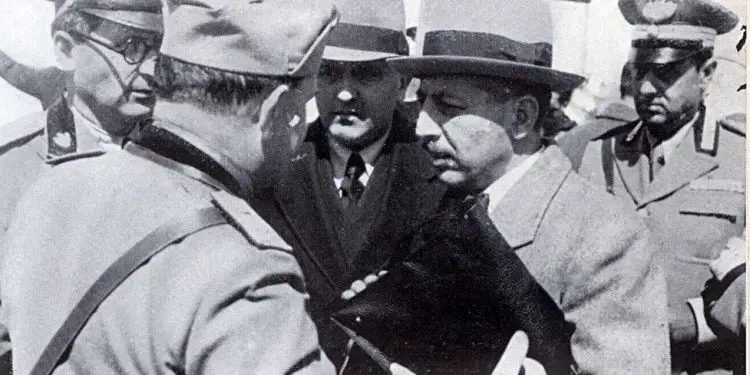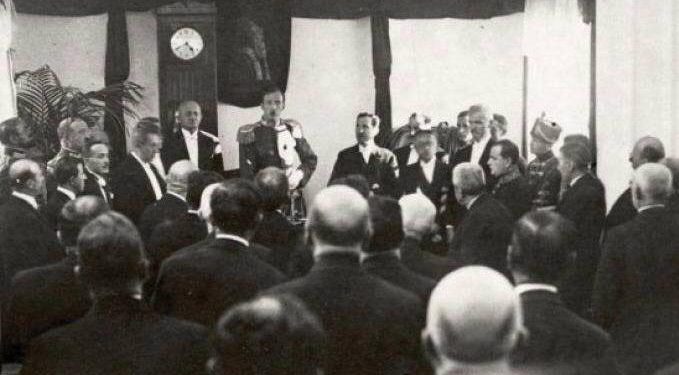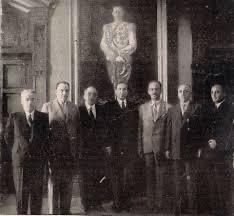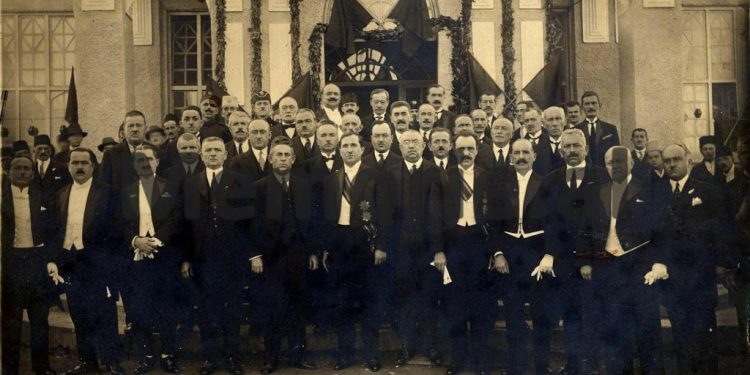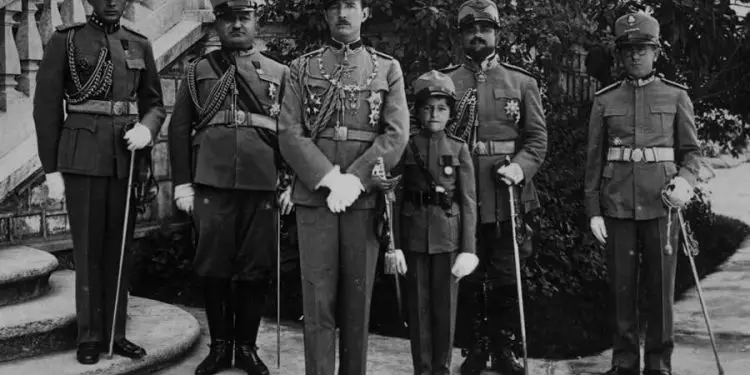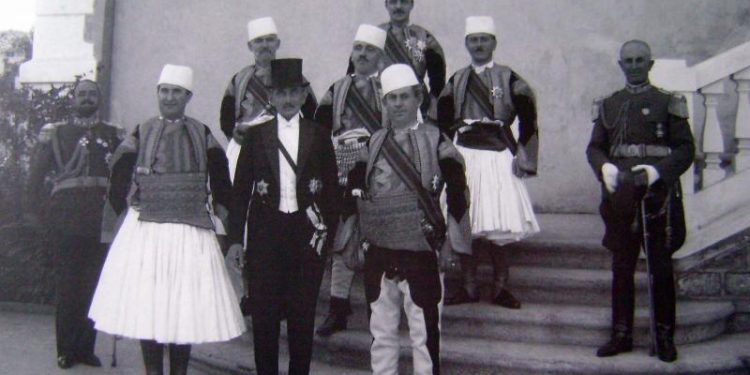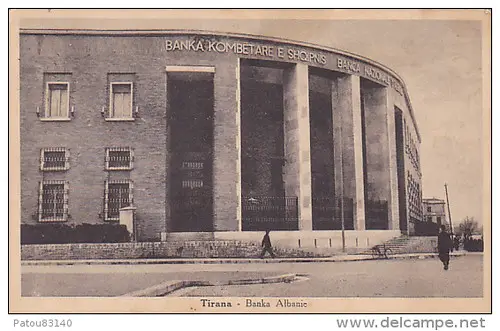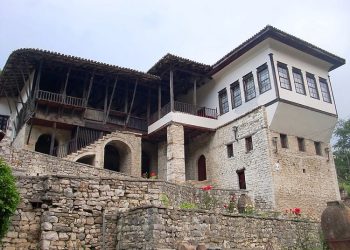Dashnor Kaloçi
Memorie.al publishes the unknown story of Rrok Gera from the city of Shkodra, who after studying for eight years in Linz and Vienna, Austria, where he graduated with a degree “Doctor of Economics”, came to Albania and throughout the Monarchy. of Zog, until 1944, served in high state functions, as Minister of Finance, National Economy, etc. His entire professional career as a Finance specialist and his vicissitudes since his deportation to Italy as an anti-fascist, to the conviction by the communist regime of Enver Hoxha with the Special Court, which in 1958, after the intervention of his close friend, Prof. Dr. Alex Buddha was released by the Supreme Court from Burrell Prison, where he was sentenced to life in prison.
Rrok Gera was born on August 15, 1901 in the city of Shkodra and he was the youngest of the children of Zef Nikolle Gera and Luçiije Vasa (of the tribe of Pashko Vasa). Geraj’s house was located in the “Firçej” neighborhood, just a few meters behind the Great Church, while their family was listed in the records of Shkodra, since the beginning of the 18th century. Rroku’s father, Zef Nikollë Gera, had a tailoring shop where he sewed national costumes, which employed 12 people, and with this work he supported his family of 11 members. Zefi was a wise man and was often called upon to separate the various courts, as he enjoyed the respect of Shkodra families. In that turn of the century when Rroku was born, Shkodra was a city with European contours, as it had a comprehensive development and at a much higher level than any other city in the country. At that time, in the schools and colleges of Shkodra, mainly the religious ones, lessons were given by highly prepared people who had graduated from various universities in Europe and beyond, who also formed the basis of knowledge and culture that was later reflected in their students. came from all over the country. Rrok Gera also studied at one of these schools, Saverian College.
Eight years of study in Vienna
After finishing primary school and the unique school, Rroku attended high school in his hometown, which he later attended in Vienna, where in 1917, like many young boys of the time, he received a scholarship from the Austrian state. He then went on to study at the Linz Academy of Commerce, graduating in 1925. After graduating from the Academy of Commerce, Rroku won a scholarship and continued his higher studies at the Faculty of International Economic Relations at the University of Vienna. During his studies in Austria, in addition to the subjects he mastered with rare passion, Rroku also benefited from a general education and a broad culture in other areas of life. At the same time, during those years he was very active in various patriotic associations of Albanian students, such as the one called “Albania”, being active in writing in its organ, the magazine “Boyhood”, where he addressed economic and financial problems. Activation in these premises, made Rroku make friends with his compatriots who also studied in Vienna, such as Frederik Shiroka, Aleks Buda, Sokrat Dodbiba, Kole Mirdita (Helenau) Daniel Rodiqi, Skënder Luarasi, etc. On July 12, 1928, he defended his dissertation with excellent results. It is said that after the answers given by the student Gera, the members of the probation commission and the whole audience applauded him for several minutes. After completing his internship at a well-known bank in Vienna, where he also received the scientific degree “Doctor of Economics”, in August 1928, Rroku finally returned to Albania.
Return to Albania and work in state structures
On May 19, 1929, almost a year after he had been waiting to be hired by the state administration, Rrok Gerra was offered the post of Chief of the Financial Section at the Ministry of National Economy and Deputy Commissioner for Anonymous Companies ( with Minister Dhimitër Tutulani and Prime Minister Koço Kota). It was during this time that Rrok Gera accompanied the well-known Austrian writer of Czech descent, Friedrisch Wallisch, who traveled with his wife through Albania, and based on the impressions of this trip, he published in Stuttgart in 1931, the book with title “Neuland Albanien” (Albania, a developing country). In the middle of the lines of that book, among other things, the author wrote: “I am accompanied by Rrok Gera, a ministry official, a half-Viennese man, cultured to the fingertips, who graduated from high school in Linz, high school in Vienna, and at a young age he has succeeded in state duties ”. On June 18, 1930, Gera was appointed Secretary General of the Ministry of Finance, headed by Kole Thaçi. Like a large number of intellectuals who had completed higher education abroad, Rrok Gera began to apply with great enthusiasm the modern knowledge and concepts he had acquired in Vienna. Meanwhile, with his work, he managed to become a well-known person in the financial circles of Albania at that time. It is no coincidence that from 1930 to 1934, at the Ministry of Finance, where he was secretary general, a large number of important draft laws were prepared, mainly on tax and customs issues. Meanwhile, the Geneva-based League of Nations elected Rrok Gerra as “Corresponding Member of its Financial Commission”. In January 1932, Gera, in collaboration with Sokrat Dodbiba, founded the magazine “Albanian Economist”. On February 25, 1935, Rroku started a family by marrying Gjyljeta Shkreli, the daughter of a well-known Shkodra merchant, Lec Shkreli, in Shkodra. Gjyljeta had studied for eight years at a Dubrovnik college in Croatia, where she had received a comprehensive training. She knew several foreign languages very well, world literature, painted, played the piano very well and was known for her extensive culture.
Gera, a member of Mehdi Frashëri’s cabinet
In October 1935, King Zog planned to form a new government, led by Mehdi Frashëri, which was considered liberal, giving perhaps the best sign of his desire to modernize the country. For the formation of his government cabinet. Mehdi Bey did not hold any of the last cabinet ministers led by Pandeli Evangel. The so-called “Faith Group” was expelled from all important positions and in his place in the government came a group of young ministers, who were well educated and protected by the desire to get the Albanian administration out of the gap where was located, and to put it on the path of order and efficiency. Rrok Gera was planned as part of this cabinet, and on October 25, 1935, he was appointed Minister of Finance in the government of the “youth”, headed by Mehdi Frashëri. Along with him in that cabinet were his schoolmates in Vienna, such as Fuat Asllani, Nush Bushati, Ndoc Naraci and Anton Krajni. Among the many congratulations that Rroku received for the new task, was that of Father Gjergj Fishta, to whom Gera responded from Tirana through a telegram, which is still preserved in his family. The ambitious nature of the “youth” government’s program immediately drew many opponents, and as a result, many problems and contradictions immediately arose between the liberal government of Parliament (then composed of many former members of Pandeli Evangel’s cabinet). . As a result, in November 1936, Mehdi Frashëri’s government resigned, following a no-confidence vote in Parliament. This is the only case in the history of the Albanian state since its establishment in 1912, when a government fell from the votes of Parliament. As a result, many projects and initiatives remained in the middle, and the ideas and rush of the “youth” were curbed by the conjunctures of the time.
British Documents on Rrok Gera
Regarding those developments in Albanian politics of that period, the documents of the British Foreign Office (Foreign Offis) which deal with Albanian politicians of the years 1930-1940, wrote about Rrok Gera: “Rrok Gera, limited to initiatives for radical change in finance ”. He was born in Shkodra in 1901 and graduated from the Jesuit College there. He completed his higher education in Vienna, where he graduated in Law and Economics. He spoke German, Italian and French. In 1932 he was appointed Secretary General of the Ministry of Finance. In October 1935, he was given the portfolio of Minister of Finance in Mehdi Frashëri’s cabinet. In addition to the technical knowledge and work experience in this department, he came to his workplace full of enthusiasm. But he had limited freedom for his initiatives to make radical changes in the financial administration during his brief stay in the Frashëri Government. He was appointed Chairman of the Audit Council in April 1937, and Minister of National Economy, when the last Government was partially reconstructed at the end of May 1938. (Prof. Dr. Luan Malltezi, Foreing Offis Report, for names of 69 Albanian politicians of the ’30s and’ 40s).
In 1938, Minister of National Economy
After the resignation of the government of Mehdi Frashëri, on November 7, 1936, Rrok Gera was appointed chairman of the Audit Council of the Albanian state. After serving for about a year and a half, at the head of that institution, on June 5, 1938, he was appointed to the post of National Economy, a position he held with great devotion until the afternoon of April 7, 1939, when the country was conquered by fascist Italy. During these years, Gera was among the most prominent figures and in any solemn ceremony, he would be present with his speech. This is what happened on the first day of the establishment of “Radio Tirana”, on November 28, 1938, where in the afternoon, Rrok Gera, Minister of National Economy, was invited for 15 minutes in the first interview conducted in the studio of this radio. Also in 1938, Rrok Gera cut the inauguration ribbon of the new building of the National Bank of Albania, where he delivered the keynote address. While on March 3, 1939, he went to the Vatican as a representative of Albania to participate in the ordination of the head of the Holy See, Pope Pius XII.
Gera’s negotiations on April 7 with the Italians as Zog’s envoy
Following the very heavy atmosphere that had gripped the country in the first days of April 1939 and in an attempt to save something, King Zog forwarded to Jakomon the proposal to sign a military agreement, to justify the presence of Italian troops in Albania, as well as to avoid a possible bloodshed. The Italian representative, in the early hours of the morning of April 7, received another telegram from Mussolini, to forward it to King Zog, in which it was stated: “The Albanian King could send his powerful representative to Durrës to discuss the military agreement with General Guzzon, the commander of the Italian troops. ” During all this time, the highest personalities of the Albanian state were constantly in a meeting with King Zog at the house of the Prime Minister, Koço Kotta, where it was decided that to negotiate with General Guzzoni, the Minister of National Economy, Rrok Gera, accompanied by the General Staff Colonel, Sami Koka. Meanwhile, the Albanian delegation consisting of Rrok Gera, Sami Koka and Colonel Gabrrielli, (Head of the Italian Military Mission in Albania), left for the city of Durrës. They were provided with credentials that, according to Rome’s envoy to Albania, Francesco Jacomoni, were compiled in French. A few years later, in his memoirs, Jakomoni would write, among other things: Colonel Gabrrielli, (Chief of the Italian Military Mission in Albania who had participated in the talks), reported to him that: Rrok Gera had announced the conclusion of the agreement military with the acceptance of well-known Albanian counter-proposals for the treaty of a close alliance. It was then decided to hold another meeting at 4 p.m. But the circumstances prevented that meeting from taking place and leaving nothing but the advancement of fascist troops to invade Albania. In conclusion, although the talks of the Albanian delegation headed by Rrok Gerën did not yield results, this act remains in history, as the last attempt to prevent the Italian occupation of April 7, 1939. According to the testimonies of his relatives, remembering what he experienced, that “black Friday”, even much later, after many difficult years during the dictatorship, Rrok Gera described April 7 as the hardest day of his life.
Gerra’s deportation to Italy as an anti-fascist
After a few weeks, Rrok Gera would go back to Italy, but this time, no longer as a representative of the Albanian state, but interned by the Italian authorities as an anti-fascist. Although he had worked for about 10 years at the helm of the country’s finance and economy, on April 7, 1939, while Rrok Gera crossed the border to Greece, he had only 200 gold paper napoleons with him, leaving no fortune in Albania. . A few days after leaving for Greece, Gera and his family asked to return home, but the Italian occupation authorities did not allow them to stay in Albania, deporting him to Italy. After several requests and statements that he would not engage in political activity, after a year of exile, the Italian authorities finally gave Rrok Gerra permission to return home. After returning to Albania, Gera began to engage in private trade and continued this type of activity throughout the occupation period. Dr. Hubert Neuvirth, currently the director of the paper on Albania at the Austrian Development Agency, in his book “Resistance and Cooperation in Albania (1939-1944)”, categorizes Albanian political personalities into several groups. In point three of this division, Neuvirth ranks Rrok Gerën alongside Faik Konica, Mehdi and Mit’hat Frashëri, etc., who represent the most honest and stable personalities in their views on the country and the national cause.
Minister of Finance in the Government of Fiqiri Dines
During 1944, Rrok Gera strongly designed and defended the project of nationalization of the Albanian National Bank, which consisted of the nationalization of a part of the shares of the National Bank of Albania, which at that time were in the hands of Italian shareholders. In a number of documents and books dealing with the issue in question, as well as in the diary of the Central Directorate of the Albanian National Bank, the primary role of Rrok Gerë in the efforts to realize the nationalization of the Bank, but also of those who are in the posts of high state, were put at the service of a foreign financial group and sabotaged this project. While Italian bank executives were very concerned about the project, in May 1944, Rrok Gera went to Italy with the aim of holding talks with the Italian financial group on the Albanian government’s projects at the time to nationalize the National Bank. Albanian. For this mission, he was given a mandate on May 10, 1944, to appoint him a powerful first-class minister, with the right to decide in talks with the Italians on the issue. On July 18, 1944, the government of Prime Minister Fiqiri Dine was formed, part of whose cabinet was Rrok Gera. He agreed to be part of this cabinet, with the intention of realizing his project for the nationalization of the National Bank of Albania. On the other hand, the Germans were worried because they had not been given the opinion of the members of that cabinet. The German concern for this action of the Albanians was clearly expressed in the telegram of the German special envoy for Southeast Europe, Nojbauer, who on July 21, 1944, addressed the German Consulate General in Tirana, writing that: “Albanian authorities they should be made aware that the Germans could not allow themselves to be confronted with the facts. ” At the end of August 1944, the Council of Ministers reviewed in its meeting the draft law on the nationalization of the Albanian National Bank, but in the meantime the Italian leaders of the Bank had taken measures to undermine the project. The documents show that Rrok Gera, in his position as Minister of Finance, persistently defended his proposal for the nationalization of the Bank at the meeting of the Council of Ministers. Which provided for the nationalization of a part of the shares of that bank in favor of the Albanian state. But seeing the firm opposition of many of the members of the government, Gera demanded that the document remain at least in the acts, as proof of the efforts of that government, for the benefit of the country’s economy. Shortly after the repeal of his bill, Gera resigned as minister. At the end of August 1944, the government of Fiqiri Dines resigned and Rroku returned to his family in Shkodra, where he found the end of the war. In that turbulent time, some people suggested to Gerra that he leave the country, but he was adamant in his decision to stay in Albania, because he was convinced that everything he had done had been for the good of the country.
Appointment of Rrok Gerra as ambassador to Berlin
During the first half of 1944, Rrok Gera had no state function, but nevertheless served the country in some very important diplomatic missions. Among these is his visit to the German delegation that negotiated with the Germans regarding the amount of Albanian gold seized and placed in Berlin and the mission in Italy to discuss with Italian shareholders of the National Bank of Albania, regarding the project for ” nationalization ”of this Bank. In the summer of 1944, the Germans thought of elevating the function of their Consul General to the level of ambassador, and Rrok Gera was appointed ambassador of Albania to Berlin on July 13, 1944. But as Bernd Fisher writes in his book Albania during the 1939-1945 War, he never actually took office, as only a few days later, on July 18 of that year, he was appointed Minister of Finance in the government of Fiqiri Dines. So Gera never went as ambassador to Berlin and instead, Rauf Fico went on to do so.
Special Court, serving a sentence and being released from Burrell Prison
After the end of the war, in January 1945, Rrok Gera was arrested by the newly arrived communists. The trial against him was part of the Special Court held in Tirana during the period February-April 1945, in which about 60 people were tried, former senior officials of the Albanian governments from the establishment of the Albanian state in 1912, to that under the German occupation. On April 8, 1945, the Special Court, presided over by Koçi Xoxen and prosecutor Bedri Spahiu, ruled on all defendants, including Rrok Gerën, who had Karapic as his defense attorney. There were no witnesses against Gerës, while witnesses in his favor were: Gjergj Kokoshi, Perikli Spiro and engineer Andrea Xega. Gera was sentenced to 10 years in prison, forced labor and confiscation of property. In November 1949, he was released from prison after taking advantage of the first amnesty, deducting 5 years from the time of serving his sentence. But on April 21, 1951, Rrok Gera was arrested again and in October 1952 he appeared in military court, which took place behind closed doors. He and his family were waiting to be released, but the court sentenced him to 20 years in prison. Gera suffered his sentence in Burrell Prison, where most of the former officials and high-ranking officials whom the communist government considered enemies of the people were kept isolated at the time. In May 1958, by decision No. 4 of 8 May 1958 of the Plenum of the High Court, Rrok Gera pleaded not guilty and was released from prison on 19 May 1958. Although he had a good physique, he could not live. more than 11 more years. On January 28, 1969, at his home in the city of Shkodra. From various scholars and historians, Rrok Gera has been described as a financier of European level and a high-ranking diplomat for his diplomatic missions, where he stood out on April 7, 1939. His figure stands out from local and foreign scholars. as a statesman, who with his honesty and skills, served the country in the most difficult moments, not only in economic and financial matters, but also in those related to the fate of Albania.
The Supreme Court acquitted Gerra in 1958, a unique case throughout the communist regime.
It is already known that during the entire period of Enver Hoxha’s communist regime, most of the deportees and political internees whom that regime considered “enemies of the people”, after serving their first sentence, were arrested again and sentenced. others in prisons and internments, sentencing them two or three times, apoo and more. Meanwhile, as if to prove the rule, for Rrok Gerë, former Minister of Finance and National Economy of Albania in some government cabinets during the period of the Monarchy of King Zog and those under the German occupation of the country, who was initially sentenced to Sepial trial in 1945, and then for the second time in 1951, became an exception. While Gera was serving his sentence in Burrell Prison on May 19, 1958, prison authorities informed him to get his clothes ready and leave the cell after he had been acquitted. According to some testimonies of his family members, Rrok Gera was extremely surprised, not only because he had not made any prayers for his release from prison, but it had never happened that any political prisoner of his rank had been released prematurely from his suffering. punishment. “It was only when I saw myself outside the bars, without any guards nearby and the sky above my head, that I realized I was really free,” the family recalls, Gera told them after returning home. His release and acquittal are confirmed by an archival document, which reads, among other things: “With decision no. 47. dt. 11.X.1952, of the Military Court in Tirana, was convicted of aiding and abetting in the occupation of Albania by fascist Italy and has sabotaged the resistance of the Albanian people, with 20 years of imprisonment, deprivation of basic rights for five years, with the decision ndt. 5.V.1958 of the Plenum of the High Court, pleaded not guilty and was released from prison on 19. V. 1958 ”.
Tirana on 20.III.1979, L. Shati (signature and seal).
These documents, his family members were able to obtain only 15 years after Gerra’s release, only after a statement given to them, Prof. Dr. Alex Buda, who consciously wrote the best words for his former schoolmate during his studies in Vienna./Memorie.al




